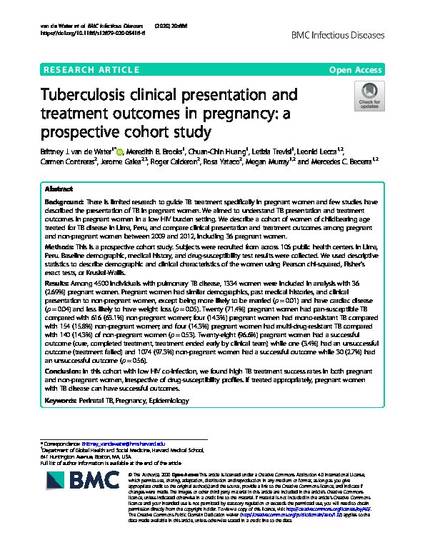
- Perinatal TB,
- Pregnancy,
- Epidemiology
Background: There is limited research to guide TB treatment specifically in pregnant women and few studies have described the presentation of TB in pregnant women. We aimed to understand TB presentation and treatment outcomes in pregnant women in a low HIV burden setting. We describe a cohort of women of childbearing age treated for TB disease in Lima, Peru, and compare clinical presentation and treatment outcomes among pregnant and non-pregnant women between 2009 and 2012, including 36 pregnant women.
Methods: This is a prospective cohort study. Subjects were recruited from across 106 public health centers in Lima, Peru. Baseline demographic, medical history, and drug-susceptibility test results were collected. We used descriptive statistics to describe demographic and clinical characteristics of the women using Pearson chi-squared, Fisher’s exact tests, or Kruskal-Wallis.
Results: Among 4500 individuals with pulmonary TB disease, 1334 women were included in analysis with 36 (2.69%) pregnant women. Pregnant women had similar demographics, past medical histories, and clinical presentation to non-pregnant women, except being more likely to be married (p = 0.01) and have cardiac disease (p = 0.04) and less likely to have weight loss (p = 0.05). Twenty (71.4%) pregnant women had pan-susceptible TB compared with 616 (63.1%) non-pregnant women; four (14.3%) pregnant women had mono-resistant TB compared with 154 (15.8%) non-pregnant women; and four (14.3%) pregnant women had multi-drug-resistant TB compared with 140 (14.3%) of non-pregnant women (p = 0.53). Twenty-eight (96.6%) pregnant women had a successful outcome (cure, completed treatment, treatment ended early by clinical team) while one (3.4%) had an unsuccessful outcome (treatment failed) and 1074 (97.3%) non-pregnant women had a successful outcome while 30 (2.7%) had an unsuccessful outcome (p = 0.56).
Conclusions: In this cohort with low HIV co-infection, we found high TB treatment success rates in both pregnant and non-pregnant women, irrespective of drug-susceptibility profiles. If treated appropriately, pregnant women with TB disease can have successful outcomes.
BMC Infectious Diseases, v. 20, art. 686
Available at: http://works.bepress.com/jerome-galea/83/
